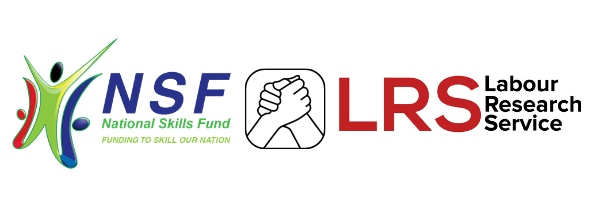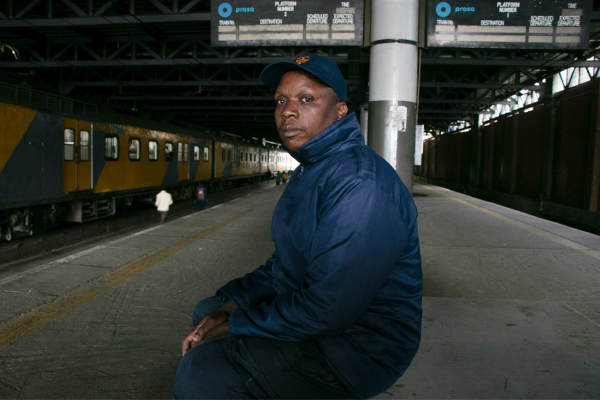If there’s one thing Patrick Mndlovu (41) knows with certainty, it’s that the private security industry is for everyone, and the issues of the women security guards are a union’s issue. As the new Provincial Chairperson for SATAWU’s security sector in Gauteng, comrade Mndlovu has an ambitious plan to increase visibility for all security guards in South Africa. He spoke about his experience participating in our Collective Bargaining Support peer learning processes for worker representatives in 2019. This work is made possible through the support of the National Skills Fund (NSF) and aims to promote informed social dialogue by addressing information and skills asymmetries in collective bargaining in South Africa.
_________________
Amazing things can happen when a diverse group of worker representatives is given a safe space to be themselves. A safe space is good for learning, trying new roles and building solidarity. 29 of us showed up for the National Skills Fund-supported LRS peer learning workshops in 2019 to learn about bargaining and organising in a hands-on manner. We represented workers in 12 different sectors, both formal and informal. Some of the comrades at the workshop were experienced negotiators and shop stewards, others hadn’t done this work for too long. And the gender balance was quite unusual for an overnight worker reps workshop – there were more women present than men.
I spoke for workers in the private security industry, which is one of the major focus industries for South African Transport and Allied Workers Union (SATAWU). I joined the union in 2005 and served as a shop steward for seven years. In late 2019, I was appointed to the position of Provincial Chairperson for the security industry in Gauteng. I can credit this appointment to several things, including the LRS peer learning workshops.
I am honoured to have been part of this core group of activists who shared their knowledge and experience, which will inform the new LRS Negotiator’s Guide. Because of this experience, I am a better leader, worker representative and champion for the rights of working women.
I will tell you about the three key things I got from the peer learning process:
A better understanding of workers’ issues and the labour laws
My biggest highlight was identifying the laws that cover the mapped sectoral priority demands. We had to research online and download the pieces of legislation. I had never researched online and it sounded complicated. The wealth of information and resources I found is astounding. Sadly, I won’t always afford the amount of data that is needed to do extensive online research.
There are three fixtures in my bag since the LRS workshops; copies of the BCEA and LRA (which I got from CCMA) and a Bible. If I had an office, the copies of the BCEA and LRA would take centre stage in the room. The laws are cardinal because they empower me to claim and protect the rights of workers.
I now know the BCEA and LRA very well. My first step when handling a grievance is to check these laws and other relevant policies. I don’t waste time and effort negotiating for a given right. I have gained the confidence to question any workplace changes that aren’t consistent with the existing laws and collective agreements.
These days I don’t panic when I receive a case to represent a worker at the CCMA. I won two conciliation cases recently. I was successful because I used the laws and tips for winning CCMA cases that I learned in the LRS space. I also tapped into the vibrant support system that has sprung from the peer learning process.
Don’t fret about handling emergency cases at the CCMA. By all means, attend and request for postponement. When dealing with dismissals, aim for reinstatement if possible. Avoid settlements that are short-term or unsustainable. The union wants us to ensure that our members are reinstated to jobs. When jobs are protected, the union retains and grows its membership.

I urge you to stand firm when you encounter hiccups or even serious challenges while using our laws. Remember we fought hard battles to have some of the best laws in the world.
Great worker leaders prioritise inclusiveness and champion women’s rights
It is said that important actions often start on a small scale. Our unions have gender equality policies for transforming workplaces. But, what are the indicators of a transformed workplace? Is it a bevy of trusted and respected women leaders and workers that have equal access to opportunities and support? Can you say your workplace is truly transformed? I can tell you the private security sector isn’t.
According to PSiRA, the regulatory body for the private security industry, there were 534 289 active security officers in South Africa in 2019. Of these, roughly 11% are women. Operators have traditionally excluded women, citing security concerns among other (discriminatory) issues. But the numbers may notch up on the back of the high unemployment affecting many women in the recent past. More women will consider the industry and the informal sector as potential sources of livelihood.
As a shop steward, I pride myself on my ability to know the needs of the people I represent. But hearing the human stories of discrimination, exclusion and violence toward women gave me pause for thought. The stories by a female security guard made me acknowledge the size of the problem. Our sector is gender-blind.

The big issues
Security guards are deployed in pairs, often comprising a woman and a man. This deployment can be problematic, especially when we are assigned to patrol deserted areas without toilets. I can’t escort my partner because if the railway cables we’ve been assigned to guard are stolen the consequence is dismissal. The thought of someone stalking us, watching and waiting for us to make a blunder is equally unsettling. Imagine staying put at your station even when you can hear your partner screaming for help. What if the network is bad and you can’t raise the backup? I pray every morning for protection and thank God when I return home safe in the evening. I raised the deployment issue with our General Secretary and he’s promised to speak to PRASA. Meanwhile, I will use my influence to ensure that women workers are deployed in areas closer to bus stops, shops and toilets.
Now I have more empathy for the struggles of women workers. Now I view the world with a gendered lens that’s allowing me to analyse simple and complex questions or problems. Now I am keen to hear every voice in the room. Going forward, I will advocate for the strategic and practical needs of women and migrant security workers. We need to look beyond uniforms, pregnancy and maternity leave, and I have begun talks with my male colleagues to get their support.
Taking charge at some point is inevitable
The peer learning workshops made me see and recognise all workers in my workplace, including those that aren’t organised by my union. Last year I assisted a worker at a bakery in Park Station in Johannesburg. The worker did not belong to a union, but she won the case and a R50 000 settlement. She eventually took a managerial position at another bakery. I asked my comrades in SACCAWU to visit the site and all the workers joined the union.
My gender sensitivity and thoughtfulness have made me popular in the union. The candidates for elections during our provincial congress last year were required to give motivation. My speech focused on increasing the visibility of the workers in the private security industry. I spoke about organising more women workers and strengthening our gender demands. I am now SATAWU’s Provincial Chairperson of the security sector in Gauteng. I thank the LRS and all my teachers for making me the leader that I am today. This victory is for all of us.








